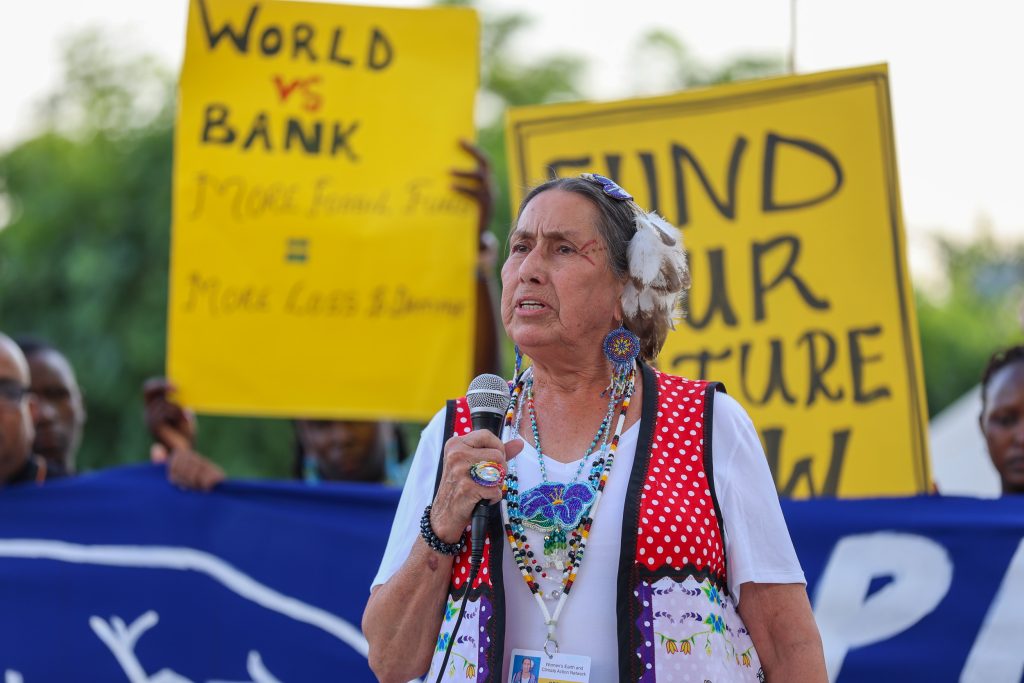
Photo by IISD/ENB | Photographer Mike Muzurakis
Written by Charlie Davies PhD student from SCENARIO DTP
“Indigenous leaders need to talk to everyone and everyone needs to talk to us” announces Chief Erasmus of the Dene Nation, in his call for indigenous peoples to be recognised and respected as nations, not symbols. As COP28 unfolds, indigenous leaders are demanding a more meaningful process, with their voices listened to.
In the opening ceremony Pema Wangmo Lama Mugum, an indigenous youth activist from the Mugum Indigenous Community, Nepal, spoke powerfully, calling for a moratorium on activities that violate their rights. She stated that:
“Our inherent, distinct, internationally-recognised rights are affirmed in the UN Declaration on the Rights of Indigenous Peoples. We will not allow these rights to be diminished, undermined, combined or confused in any way”.
The feeling of being overlooked and dismissed has been echoed by indigenous voices throughout COP28. Chief Erasmus of the Dene Nation wishes for their lands and authorities to be recognised in the same way as the UN nations, in order to show:
“that we have soviet authority, and that we have a say, and that we do need to be at all of the tables”.
This feeling is echoed by Callie Davies-Flett, Athabasca Chipewyan First Nation Member, Employee and Regulatory Advisor, who affirms:
“I want to be able to sit at more tables and say yes or no”.
Indigenous communities have both a wealth of knowledge about their lands and a willingness to share their perspective, but they are also quick to tell you what they don’t know. Brian Fung, Manager of Government Relations, Athabasca Chipewyan First Nation stated:
“We have a clear understanding that we don’t have all the answers, we know that western science plays a role in filling in some of those things”.
The Arctic Council1 is a great example of this sort of collaboration, in which indigenous peoples are at the table with polar countries, including Canada, The Russian Federation and Iceland. Chief Erasmus of the Dene Nation says here indigenous peoples have had a say for the last 25 years. Such inclusion has allowed for fundamental principles2 of Traditional Knowledge to inform the foundation of long-term visions for Arctic Council activities.
Despite this, in Canada, there is a power imbalance. Although a treaty exists and, as Brian Fung points out:
“indigenous communities and first nations cannot have those treaty rights infringed upon”,
there are still infringements. When these happen, indigenous communities and first nations do not have the resources or funding to take on the fight. They must take industry groups or governments to a western court, for decisions on what happens on their lands. Although indigenous communities have been allowed to represent their rights, the western court is tasked with determining what is or isn’t a treaty right. As Brian puts it, this has resulted in a narrowing of treaty rights to “simply cultural practices”.
It’s not just their rights and recognition that indigenous communities are fighting for. They need access to climate finance and more specifically the loss and damage fund.
“Indigenous peoples receive less than 3% of international climate finance. This funding is inadequate, and usually inflexible and inefficient,” says Razan Al Mubarak, IUCN President and UN Climate Change High-level Champion for COP28. According to the WWF,3 indigenous peoples comprise less than 5% of the world’s population, yet protect 80% of the world’s biodiversity. As we are facing a warming world, resulting in biodiversity loss, droughts and floods, indigenous communities sit at the front line.
Despite their critical role in ensuring our planet remains resilient and healthy, the money that is supposed to support indigenous communities seems to “evaporate in complex transactions through numerous layers of multilateral institutions” explains Lord Goldsmith, Former Minster of the Foreign, Commonwealth and Development Office, UK Government.4
There are further concerns for indigenous communities in Canada, who may struggle to access the loss and damage fund in a country deemed too wealthy to need these resources and yet, as Brian Fung explains, still home to indigenous communities who don’t have clean water.
So, although indigenous peoples are present at COP28, we need to ensure that they are recognised, that their expertise is utilised, that their voices and efforts are acknowledged, that they are involved in every conversation and that they receive the support they need, given their position at the forefront of the climate crisis. As Keji Banjoko, in charge of Government Relations for the Athabasca Chipewyan First Nation points out:
“In order to create change, you have to have the power “.
Sources:
- The Arctic Council (2023) Arctic Council. Available at: https://arctic-council.org/ (Accessed: 07 December 2023).
- Indigenous peoples’ secretariat (2023) Indigenous Peoples’ Secretariat. Available at: https://www.arcticpeoples.com/ (Accessed: 07 December 2023).
- WWF (2020) Recognizing indigenous peoples’ land interests is critical for people and nature, WWF. Available at: https://www.worldwildlife.org/stories/recognizing-indigenous-peoples-land-interests-is-critical-for-people-and-nature#:~:text=Although%20they%20comprise%20less%20than,they%20have%20lived%20for%20centuries (Accessed: 07 December 2023).
- EuroNews (2023) Trust us to manage climate funds ourselves, indigenous peoples ask, euronews. Available at: https://www.euronews.com/green/2023/12/05/climate-funds-for-indigenous-peoples-evaporate-before-reaching-them-report-reveals#:~:text=%22The%20money%20often%20appears%20to,rights%20as%20a%20climate%20solution (Accessed: 07 December 2023).

